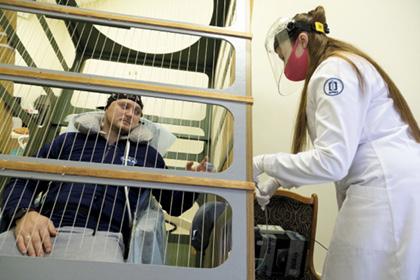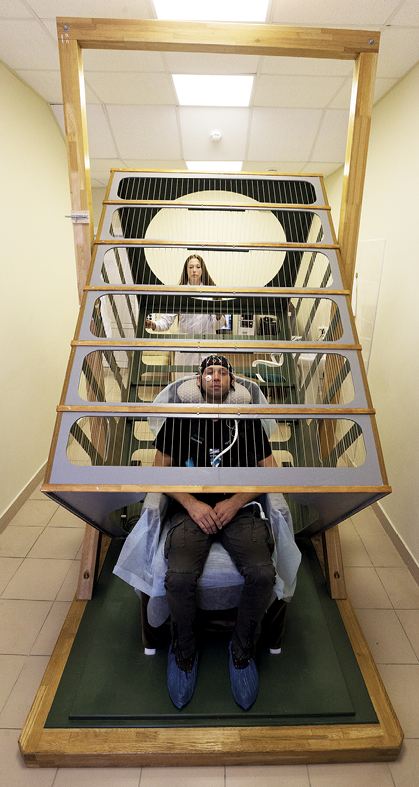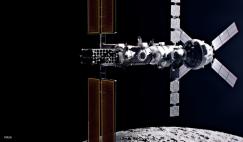The evolution of living organisms took place under the conditions of Earth’s magnetic field, and the International Space Station (ISS) is in low Earth orbit, where cosmonauts and astronauts are protected by Earth’s magnetosphere. However, the exploration of deep space, including flights to the Moon and Mars, imply going beyond its limits, which make research into the influence of the reduced magnetic field on the human body an urgent problem for humanity.
Risks to human health in space have always been present and will remain in the future. They are closely related to the complex impact of extreme factors: microgravity conditions, radiation risks, working in isolation without the possibility of an emergency return to Earth, and other factors. To these factors that of the reduced magnetic field must now be added, since it has been studied so little to date.
In addition, hypomagnetic conditions may increase the impact of spaceflight factors and create additional risks to the health of space exploration crews in the future. Hypomagnetic fields are ‘near-zero magnetic fields’ and are known to impact biological phenomena, including developmental processes, the circadian system, neuron and brain activities and calcium balance in cells. This is especially true for increased radiation which, combined with a hypomagnetic environment, will increase its destructive effect on living organisms.
 Test subject being prepared for study.
Test subject being prepared for study.
According to the few literary data describing experimental sessions on laboratory animals, it becomes clear that the main systems affected by the decrease in the magnetic field of our planet are the central nervous system (especially its higher sections controlling cognitive processes and forming complex acts of behaviour) and the cardiovascular system (in terms of its regulation mechanisms).
Experimental studies involving humans are always associated with the complexity of the organisation due to bioethical limitations, especially if the effect on the body of an unstudied or little-studied factor is simulated. However, scientific thought is always moving forward and scientists organise such research to take into account all modern bioethical requirements; however, this requires scientific courage, extensive experience and knowledge.
Currently, the Institute of Biomedical Problems (IBMP) of the Russian Academy of Sciences is working on studying not only microorganisms, plants and animals, but also the first steps towards the study of possible effects of a gradual decrease in the Earth’s magnetism as humans move away from our planet.
 A volunteer in situ in the ARFA installation.
A volunteer in situ in the ARFA installation.
Study structure
Studies included methods approved by a bioethical commission and allowing for a comprehensive assessment of the impact of conditions of reduced magnetic field on the state of all systems and on the organism as a whole
IBMP scientists conducted a series of studies, involving healthy volunteers, which included the effects of reduced magnetic fields (by up to 1000 times) of different durations. The study design was done in such a way that neither the volunteer testers nor the researchers knew whether the unit was on or what level of reduction it was set to. In this way, the placebo effect was also studied in comparison with the changes that occurred in each stage of the experiment.
The first stage of the experiment involved an eight-hour exposure of the body of a healthy person to a reduced magnetic field.
The second stage of the experiment was a 24-hour exposure, which was divided into three periods of eight hours with a short break between each. This was done because hypomagnetic conditions in the IBPM’s ‘ARFA’ installation (see photos) were created in a limited volume, which implies a ‘sedentary’ lifestyle and the subjects needed to rest and warm up.
The third stage of the experiment included not only the ‘placebo’ and ‘exposure’ series, but also three different degrees of severity in the decrease in the magnetic field (the reduction factor was 350, 650 and 1000 times).
The beginning of each series was preceded by background studies to obtain initial data on the state of a particular body system in order to be able to assess the degree of change and the severity of the reaction to the impact. Medical personnel supervised the subjects, such that the sleep and rest schedules, food intake and drinking regimen were strictly regulated.
The studies included a large set of methods approved by a bioethical commission and allowed for a comprehensive assessment of the impact of conditions of reduced magnetic field on the state of all systems and on the organism as a whole. To assess the state of the cardiovascular system, Holter monitoring was carried out, and indicators of heart rate, pressure and speed of blood movement through the vessels, etc, were analysed. The functional state of the central nervous system was assessed using electroencephalogram data, followed by numerous questionnaires and tests for attention, memory and performance to identify any errors in the operator’s activity.
To assess the state of the respiratory system, the function of external respiration was assessed, while gas exchange and energy expenditure during rest were studied (using spirometry before and after continuous eight-hour exposure to hypomagnetic conditions).
An analysis of changes in the pain threshold and the level of cortisol in the blood was made, in addition to monitoring all biochemical parameters. Changes at the molecular level were also studied using state-of-the-art proteomic methods.
 Conducting psychophysiological testing (far left) and monitoring showing geomagnetic conditions in the ARFA installation
Conducting psychophysiological testing (far left) and monitoring showing geomagnetic conditions in the ARFA installation
Results
Proteomic analysis performed using mass spectrometry showed an increase in the concentration of a protein associated with Alzheimer’s disease
As for the results obtained during the experiment, concrete changes in almost all studied parameters appeared closer to the end of the exposure, when a cumulative effect was observed.
The structure of the heart rhythm - associated with adaptation and regulatory processes in the circulatory system - changed, activity of the parasympathetic regulation component decreased and daytime sleepiness increased. The electroencephalogram showed slow rhythms that are characteristic of the sleep state, which is why cognitive processes deteriorated.
Also, under the influence of the hypomagnetic environment, the protein composition of the blood changed. Proteomic analysis performed using mass spectrometry showed an increase in the concentration of a protein associated with Alzheimer’s disease. This does not mean that the testers developed brain disorders, just that a tendency for similar changes at the protein level was observed.
These promising and undoubtedly relevant studies for space medicine, conducted at the Institute of Biomedical Problems, are the basis not only for studying the influence of unknown factors in space and for confirming bold scientific hypotheses, but constitute a priority in the exploration of outer space by Russian scientists.
Planning for space missions beyond low Earth orbit determines the need for further careful investigation of physiological effects of the reduced magnetic field on all systems of the human body, which are currently limited, as already mentioned, by bioethical issues and a small sample size.
About the authors
Elena Luchitskaya, PhD is a senior scientific researcher in autonomic regulation of cardiovascular systems and a Full Member of the International Academy of Astronautics (IAA). She is a Principal Investigator for the Cardiovector experiment onboard the ISS and responsible for teaching experimental methods to Russian cosmonauts and analysing their pre- and postflight data, and physiological information from the ISS. She was a crew commander on the Luna-2015 simulation flight to the Moon and a researcher in the Sirius-17 isolation experiment.
Vasily Rusanov is Head of the Laboratory of Regulation of the Cardiovascular and Respiratory Systems at the Russian Federation State Scientific Research Center - Institute of Biomedical Problems, Russian Academy of Sciences (IBMP RAS). He has a PhD in the field of Human Physiology and participated in the preparation of ISS experiments associated with the study of systemic hemodynamic changes in microgravity and isolation (Mars-500, Moon-2015, SIRIUS). He is an investigator for the spaceflight factors experiment on the ISS (Cosmocard) and the author of more than 60 articles.
Orlov Oleg graduated from the Moscow Medical Academy in 1984 and started his research career at the Institute for Biomedical Problems (IBMP), where he investigated spaceflight factors, developed countermeasures, improved astronaut selection and training schedules and introduced space medicine methods into health care practice in Russia. He is a board member of the Space Council of the Russian Academy of Sciences and Russian Co-chair of the Russian/US Joint Working Group on Space Biomedicine. He is also a professor of the Moscow Medical Stomatological University and an editorial board member of Russian and international scientific journals, chief-editor of the Aerospace and Environmental Medicine journal and author of more than 170 publications.














